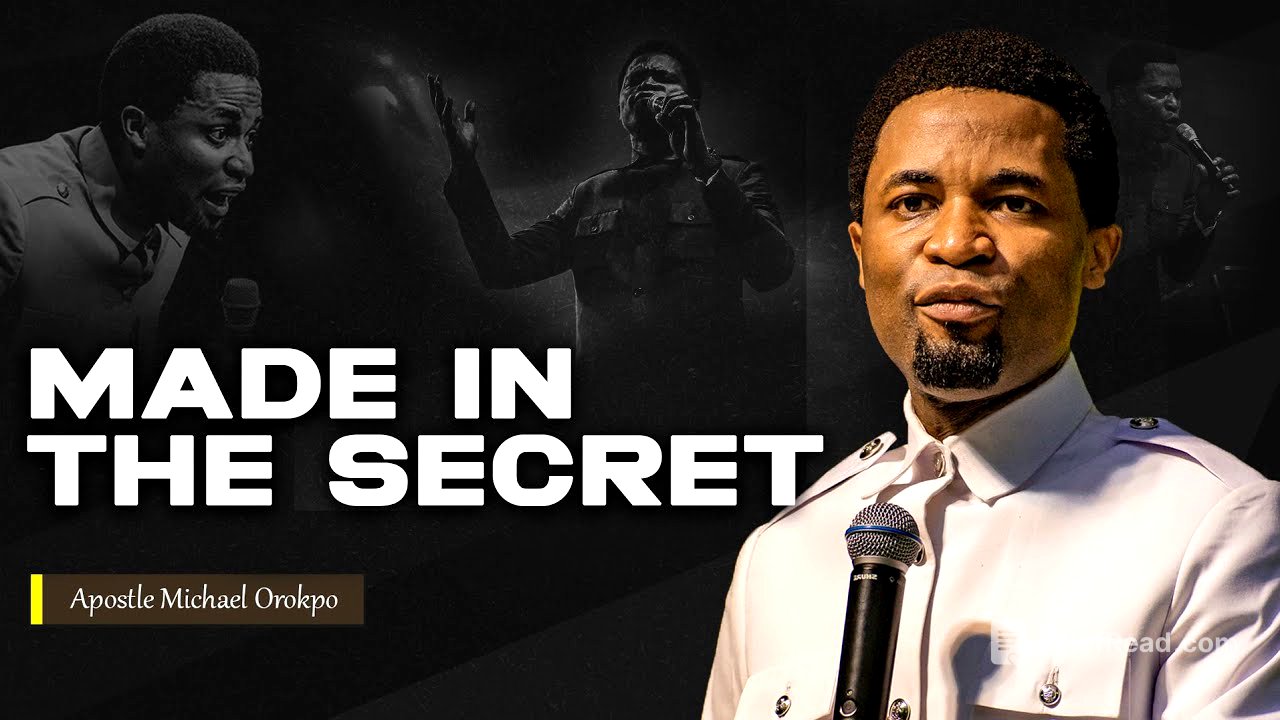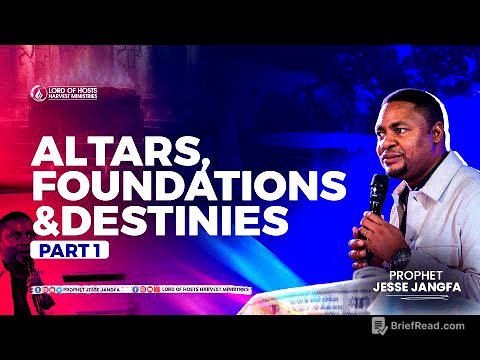TLDR;
This video discusses the principles of spiritual rising, emphasising the importance of understanding seasons, responding to encounters, and managing warfare. It highlights the need for sensitivity to changes in spiritual appetite, the power of personal prophecy, and the significance of consecration and humility. The video uses biblical examples like Joseph, Moses, and Daniel to illustrate these points, encouraging viewers to recognise their ordination and persevere through challenges to fulfil their destiny.
- Understanding and discerning spiritual seasons is crucial for advancement.
- Personal encounters and prophecies should be acted upon and warred with in prayer.
- Maintaining consecration and humility are vital for being trusted with greater power and influence.
Introduction: Recognising Spiritual Warfare [0:07]
The speaker opens by addressing the phenomenon of sudden gossip and bitterness directed towards an individual. He advises against immediate confrontation, suggesting instead to withdraw and discern the underlying cause. This could signify the arrival of a new mantle, which often attracts spiritual warfare. These battles serve as a summons to seek divine guidance, providing a compass for one's destiny. Misunderstanding these seasons can lead to unnecessary conflict and the abortion of one's potential.
Understanding Spiritual Seasons [0:44]
The speaker stresses that our true battle is with spirits, not people, who are merely puppets. Envy and lies are spiritual tactics to distract from one's path. It's crucial to identify the season one has entered—be it Davidic, Joseph, Moses, Elijah, or John the Baptist—as each carries a unique spiritual signature and accompanying battles. Financial difficulties, for example, may be a divine redirection towards eternal values. When conventional efforts fail, prayerful inquiry is essential to understand God's message and prepare for future opportunities.
The Protocol of Rising [1:56]
The speaker explains that genuine rising involves enduring battles that sharpen one's glory, making them unshakeable and a true representation of God's signature. Those who rise without this protocol often experience fleeting success. Sensitivity to times and seasons, as demonstrated by the sons of Issachar, is vital. The speaker references Ezekiel 37:1-9, highlighting the power of prophecy to bring life and advancement. He encourages individuals to become prophets over their own lives, using scripture to shape their future.
The Power of Personal Prophecy [3:46]
The speaker recounts his personal experiences of longing for prophetic words, noting that true manifestation comes from within. He shares the story of Pastor Chris Ailov, who, despite lacking external validation, prophesied to himself using scripture. This self-declaration inspired the speaker to do the same, emphasising that a closed mouth can lead to a shortened destiny. Personal prophecy builds confidence and prepares one for the challenges ahead.
The Significance of Challenges [6:37]
The speaker explains that the stories of great individuals are inspiring because they highlight the challenges overcome, not the ease of their success. These challenges become a message for future generations, demonstrating resilience and faith. Even when there seems to be no way forward, God can create a new path. This is called ordination, a pre-written destiny that assures one is not forgotten or stranded.
Understanding Ordination and Seasons [7:29]
The speaker emphasises that latching onto one's ordination guarantees eventual rising, as something is already written. God orchestrates seasons to align individuals with their destiny, causing things to fall into place effortlessly. He uses the example of Mary, who, by aligning with a prophetic season, became a blessing for all generations. Missing these seasons can hinder one's rise significantly.
Responding to Encounters and Warfare [10:13]
The speaker advises that encounters should be warred with in prayer and fasting until they manifest as prophecies, opening doors to destiny. He contrasts this with those who trivialise encounters, remaining stagnant. Mary's immediate action after her encounter with Gabriel is presented as an example of seizing the moment. Encounters, especially those with Jesus, demand action to fulfil their potential. Great seasons often come with battles, requiring individuals to seek divine guidance to stay focused on their destiny.
Recognising and Responding to Burdens [12:32]
The speaker identifies changing appetites as a key indicator of a new season. Increased hunger for prayer, fasting, giving, and serving are signs that one must be spiritually sensitive and responsive. He uses the example of Moses, whose desire for his brethren surpassed the pleasures of Egypt, leading him to his prophetic destiny. Ignoring these promptings can prevent one from reaching their ordained potential.
The Power of Consecration [15:22]
The speaker underscores that everyone has a written destiny and ordination. He shares a testimony of a sister who, facing a life-threatening situation, recalled the teaching on ordination and declared her survival. Knowing one is sent and has a purpose is a powerful defence against adversity. Luck and chance are not factors in destiny; God's pre-written plan is paramount. Joseph's story illustrates that challenges are part of the process, and maintaining a positive outlook is essential.
The Role of Hardship and Integrity [18:43]
The speaker explains that giving up or becoming frustrated indicates a lack of understanding of ordination. He references Habakkuk 3:17-18, highlighting the importance of rejoicing in God despite hardships. Every ordination comes with consecration, and violating this can alter one's path of destiny. Joseph's refusal to compromise with Potiphar's wife is an example of maintaining consecration at all costs.
Humility as a Key to Rising [20:52]
The speaker asserts that humility is essential for rising, contrasting it with the pride and arrogance prevalent in today's generation. He distinguishes between arrogant and subtle pride, noting that the latter is often more insidious. Subtle pride is revealed through defensiveness when unappreciated, difficulty in forgiving, and an inability to collaborate with others. God looks at the heart, and humbling oneself is necessary for divine lifting.
The Importance of Consecration in Daily Life [22:55]
The speaker uses the example of Daniel and his friends, who refused to defile themselves with the king's meat, demonstrating unwavering allegiance to God. This commitment to consecration led to them being ten times better than their peers. Hardship should not lead to compromise; maintaining consecration allows God's hand to appear. The stories of those who endure hardship become messages of hope for future generations.
Responding to Seasons and Encounters [24:53]
The speaker reiterates that seasons bring burdens, and failing to respond to them hinders one's rise. He shares his personal experience of fasting daily for five years, unaware that he was aligning himself for a greater purpose. Missing seasons means efforts outside of them are futile. Encounters, even faint ones, should be pursued with intensity until something divine is born. He cites Strife Masua, who built a telecommunications empire based on Psalm 2:8, as an example of acting on a scriptural encounter.
The Role of Mentorship and Action [27:39]
The speaker explains that God often sends men to lift others, referencing Paul's encounter with Jesus and subsequent ordination by Ananias. Arrogance prevents many from rising, as they believe they don't need others. He stresses the importance of discerning and valuing the individuals God sends. Faith without works is dead, and encounters require action. He recounts his early preaching experiences in schools, facing rejection but persevering.
Maximising Seasons Through Action and Humility [30:14]
The speaker shares how he used his teaching position to minister to students, integrating spiritual truths into his lessons. This proactive approach led to increased opportunities and recognition. He recounts a vision of Dr. Pastor Paul, which led to a powerful mentorship experience. The speaker emphasises the importance of humility and honouring those God places in one's path.
The Power of Prophetic Impartation [33:11]
The speaker describes the intense experience of being ministered to by Dr. Pastor Paul, receiving prophetic declarations and commandments. This impartation cancelled negative influences and opened new dimensions in his destiny. He highlights the importance of integrity and consecration, sharing how his commitment to honesty as a teacher became a testimony to his students.
Consecration as a Foundation for Trust [36:14]
The speaker recounts how a revival broke out in his school due to his ministry, leading to doors opening and his messages going viral. He eventually left his teaching job to pursue his calling, experiencing significant financial blessings. Consecration proves to God that one can be trusted with power and represents His interests. The speaker concludes by emphasising the importance of seasons and honouring those God sends to help one rise.









